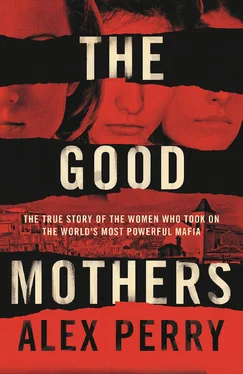As long ago as 1892, the ’Ndrangheta had admitted two women highwaymen into its ranks. John Dickie found court records from the 1930s showing that the picciotti once had a pronounced personal and professional attachment to prostitution as both pimps and johns. But it seemed that the ’Ndrangheta later dispensed with prostitution because, though the trade was lucrative, it was built on qualities like infidelity, loose discipline and double standards which were inimical to order and control. The closed, buttoned-up, isolated family culture of traditional Calabria, on the other hand, was perfect for organised crime. Family ties were also how the ’Ndrangheta fashioned a global criminal octopus out of the pattern of Calabrian emigration to the US, Canada, Australia, South Africa and Latin America in the 1920s.
The more she read, the more Alessandra realised that the ’Ndrangheta’s true genius had been in co-opting the Italian family. The more the ’Ndrangheta made itself indistinguishable from traditional, family-based Calabrian culture, the more anyone thinking of leaving the organisation had to consider that they would be abandoning all they knew and all they were. For most, it would be impossible to see beyond it.
But by basing itself around family, the ’Ndrangheta hadn’t merely been bolstering secrecy and loyalty. It had understood that family itself was a source of corruption. The undeniable love of a mother for a son or a daughter for a father – these were the sorts of bonds that ensured even the most law-abiding broke the law. Fathers would advantage their families however they could. Children would never betray their parents. Mothers, above all, would do anything to protect their children and wreak terrible revenge on those that harmed them. The ’Ndrangheta was the family augmented and accentuated into a perfect criminal entity. It was, of course, a diabolical transformation. The use of children was plainly child abuse, while to pervert the family in a country like Italy was to poison the soul of a nation. But it was also a masterstroke. If family was the basis of its power, and family was the essence of Italy, then family was how the ’Ndrangheta could corrupt the country.
For such a clan endeavour to work, Alessandra was convinced women had to have a role. And from her reading of case files and investigations, she soon discovered they had several. Women acted as messengers between men on the run or in jail, passing along tiny, folded notes – pizzini – written in a code of glyphs and addressed by the use of a code of numbers. If a man was killed or inaccessible in jail, his widow could become his de facto replacement and continue the family business. Some women acted as paymasters and bookkeepers.
Most significantly, women ensured the future of the ’Ndrangheta by producing the next generation of ’Ndranghetisti, raising children with an unbending belief in the code of honour, vendetta and omertà , and a violent loathing of outsiders who, the mothers whispered, were weak and without shame with their loose talk and looser women. ‘Without women performing this role, there would be no ’Ndrangheta,’ said Alessandra. Secrecy and power were the goals. Male misogyny and female subservience, forced or even willing, were the means.
What confirmed women’s influence inside the ’Ndrangheta was that, though they were often the victims of its violence, they also instigated some of it. Alessandra was astonished to hear about one mother from the Bellocco clan who outdid all the men for bloodthirstiness. The carabinieri had managed to bug a family meeting convened to discuss how best to avenge the death of one of their men, killed in a clan feud. The men proposed killing every male member of the rival ’ndrina . Then a woman spoke up. ‘Kill them all,’ she said. ‘Even the women. Even the kids.’ The woman wanted an entire family of thirty wiped from the face of the earth.
There was no way any of it worked without the mothers, thought Alessandra. And to a resourceful and open-minded prosecutor, that held out an enticing possibility. In the twenty-first century, there had to be other Lea Garofalos out there, mafia mothers who were unhappy with their lives and the destiny of their children. The mother, the madonna, was a holy figure in Italy and the ’Ndrangheta had corrupted her and bent her to its criminal will. There had to be women inside the organisation who hated the way they were being used. It had to be possible for Alessandra to offer these knowledgeable figures a different life and persuade them to betray their husbands and fathers. And imagine if she could. ‘It would break the chain,’ she told her fellow prosecutors. ‘It would remove the guardians of the ’Ndrangheta’s traditions. If they took their sons too, then they would be removing future soldiers. It would be very special, very important. It would impoverish the entire mafia family. It would undermine the whole culture and the mindset.’
Alessandra was refining her theory. The way to destroy The Family, she was beginning to realise, was through its mamas .
In January 2010, Pignatone and Prestipino finally gave Alessandra the job she wanted. 1From the New Year, she would be lead anti-mafia prosecutor for Calabria’s west coast, taking in the villages on the Gioia Tauro piano , the town of Rosarno and the port of Gioia Tauro. She would report directly to Pignatone and Prestipino. She would also have a second prosecutor as her junior, Giovanni Musarò, a thirty-seven-year-old on his first big posting.
Like Alessandra, Musarò was attracted by Pignatone’s and Prestipino’s dynamism. ‘I was very young, they had this huge experience from Palermo and they brought with them a completely different way of working,’ he said. Borrowing from Falcone and Borsellino, the old model of prosecutors as ‘lonely heroes’ was out, said Giovanni. The new watchword was collaboration. ‘They put a great effort into creating a team, sharing information with colleagues and behaving like a democracy,’ he said. Each member brought different strengths. ‘Alessandra was driven by ethics and very determined. Pignatone had a great ability to predict events. Prestipino was very clever and very pragmatic. He knew all his investigations and all his investigators. He was able to go to each of us and say: “Maybe go to Alessandra and you’ll find this. Or maybe go here and ask this investigator, and they’ll help you with this.”’
For Alessandra, the prize was her new territory. Palmi, on the southern end of the Gioia Tauro estuary, was where the ’Ndrangheta was born. A century and a half later, the piano remained the heart of the empire. Though you wouldn’t know it to look at the place, thought Alessandra. The ’Ndrangheta was richer than most global corporations and in Rosarno even the most minor ’Ndrangheta family was thought to have three, four or five million euros stashed away. Yet somehow in a country of amber cornfields, olive hills and blue mountains sprinkled with red-roofed villages and magnificent Roman and Renaissance cities, the ’Ndrangheta had contrived to make their towns into verrucae of unkempt, concrete ugliness. Touring Rosarno for the first time, Alessandra felt like she’d arrived after an apocalypse. Everything looked scorched. The trees were blackened and their leaves orange and brittle. The single park was just chalky pebbles and dry spiky weeds. The streets, whose asphalt resembled spilled lava, were strewn with refuse. Everything was covered with crude graffiti. And the town was dead. Shops were shut or deserted. Many of the breezeblock houses were unfinished and empty, their gardens building sites and their glassless windows as vacant as the eyes of a skull. In the main piazza, no one sat on the benches, no one ate in the restaurants. To one side, a children’s playground consisted of a rusted swing, a broken slide and a shattered piece of concrete littered with wrappers, cigarette butts and broken glass. Alessandra could feel it. The fear. The omertà .
Читать дальше












